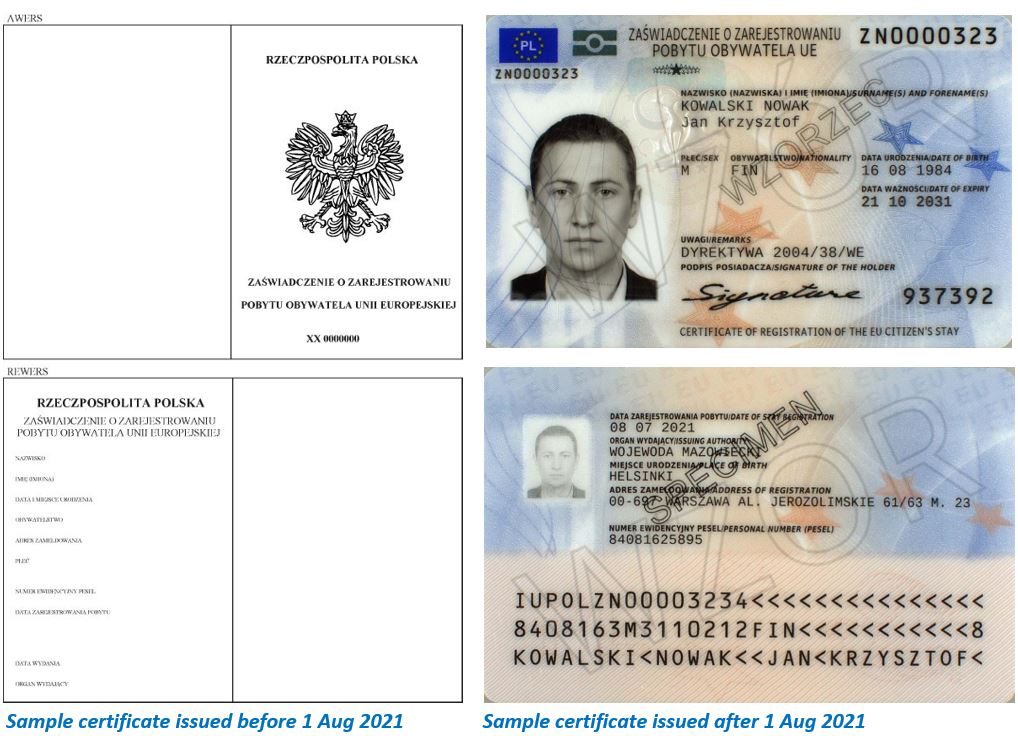EU Citizens in Poland: Register or Replace Your Certificate Before 3 August 2026
March 12, 2025

Countries / Territories
Related contacts
Related contacts
Related contacts
By: Magdalena Dymbel, Zaur Gasimov, Maciej Sielicki
Following Directive 2004/38/EC of the European Parliament and of the European Council of 29 April 2004 on the right of citizens of the Union and their family members, EU nationals must complete registration formalities in the foreign member state in which they reside, should they wish to stay there for more than three months.
EU nationals can benefit from access to the labour market in Poland as they do not require any work authorisation, just as Polish nationals. However, those who stay in Poland for longer than three months are obliged to complete so called ‘EU registration.’
Who qualifies for an EU registration certificate in Poland?
Based on the law, the EU citizen registration could be completed for individuals who meet one of the below requirements:
-
-
- are employed or self-employed in Poland;
- have sufficient financial means to support themselves and their family members in Poland so as not to become a burden on social service;
- are studying in Poland; or
- are married to a Polish national.
-
Replacing an EU registration certificate: Key deadlines and requirements
Based on the current legislation, registered EU nationals receive a registration certificate valid for 10 years. Certificates issued before 1 August 2021 did not indicate any expiry date, although they are considered valid by 3 August 2026. However, while they are technically considered valid, they must be changed to the new version of the certificate (Based on the Act of 10 December 2020) by 3 August 2026.

An application for the replacement of an EU citizen's residence registration certificate should also be submitted if any of the following apply:
-
-
- An individual’s personal data have changed.
- An individual’s document has been damaged.
- An individual’s facial image has drastically changed.
- An individual’s document has expired.
-
Poland-specific considerations
The authorities are to accept the EU certificate replacement application if submitted anytime until 3 August 2026. However, practices of individual Immigration offices may vary, and the approach of authorities across Poland may differ. For instance, the Warsaw Immigration Office prefers the replacement application to be submitted six to eight weeks before the August 3 deadline, making advanced planning imperative.
Eligibility criteria for EU registration certificate replacement indicated in the law are more relaxed than for the initial registration application. However, each jurisdiction in Poland reserves the right to introduce slightly different requirements from supporting documentation perspective. For instance, some jurisdictions require an applicant to submit the documents confirming the purpose of stay in Poland exceeding three months. This could typically be satisfied by providing fresh copies of documents on the purpose of stay filed at the time of initial application, such as a re-signed letter of employment verification or the most current student status certificate.
Unfortunately, Polish authorities infrequently publish the most current practices in advance, making the process challenging if not defined prior to application submission. It is advisable to seek the advice of an immigration professional when considering the best approach for applying.
Need to know more?
For the most up-to-date information on this matter and/or assistance with such applications, please contact Senior Manager Magdalena Dymbel at [email protected], Manager Zaur Gasimov at [email protected] and Senior Immigration Consultant Maciej Sielicki at [email protected].
This blog was published on 12 March 2025, and due to the circumstances, there may be frequent changes. To keep up to date with all the latest updates on global immigration, please subscribe to our alerts and follow us on LinkedIn, X, Facebook and Instagram.
Countries / Territories
Related contacts
Related contacts
Related contacts
Explore more at Fragomen

Fragomen news
The Montreal office has added Partner Julie Lessard and Counsel Elsa Agostinho and Sophia Khanzadian to strengthen its immigration services.

Blog post
Destination Services Director Christine Sperr examines how housing market reforms, rent stabilization measures and cost-of-living dynamics in Saudi Arabia are influencing workforce mobility, compensation planning and long-term settlement strategies under Vision 2030.

Blog post
Manager Dr Adela Schmidt and Senior Associate Isabel Schnitzler analyse the European Commission’s infringement proceedings against Germany concerning its Vander Elst visa requirements for third-country nationals providing short-term cross-border services and explain why current compliance obligations remain unchanged.

Blog post
Latin America & the Caribbean Managing Partner Leonor Echeverria, Senior Associates Sarah Blackmore and Sonya Cole and Senior Regional Knowledge Manager Laura Weingort examine renewed energy interest in Venezuela and outline key immigration pathways, procedural constraints and strategic considerations for compliant talent deployment.

Media mentions
Senior Manager Andreia Ghimis highlights how the EU’s new migration strategy could create opportunities for employers while increasing compliance requirements.

Awards
Partner Julia Onslow-Cole is recognised in the Spears 500 guide to leading private client advisers, reflecting her experience advising high-net-worth individuals, families and global businesses on complex UK and European immigration and mobility strategies.

Media mentions
Partner Abeer Al Husseini discusses increased scrutiny of Saudi business visas in AGBI, highlighting stricter review of short-term entry used for operational work and the implications for regional employers.

Awards
Australia and New Zealand Managing Partner Teresa Liu, Partner Charles Johanes, Practice Leaders Hedvika and Leader Ben Lear and Senior Associate Hannah Scanlan are recognized in the 2026 edition of Doyle’s Guide as leading immigration practitioners in Australia.

Awards
Fragomen is ranked Band 1 for Immigration: Business in the Chambers Global 2026 Guide, marking two decades of recognition since 2006. The firm is also the only firm ranked Band 1 in the Global: Multi-Jurisdictional Immigration category and receives additional individual recognitions in the USA: Business Immigration rankings.

Media mentions
Partner Rick Lamanna provides insight to Buffalo Toronto Public Media on potential IRCC processing challenges as Canada prepares for increased visa demand ahead of the 2026 FIFA World Cup.

Blog post
Immigration Director Deirdre Murray explores the impact of upcoming employment permit changes on employers and workforce planning in Ireland.

Fragomen news
The Montreal office has added Partner Julie Lessard and Counsel Elsa Agostinho and Sophia Khanzadian to strengthen its immigration services.

Blog post
Destination Services Director Christine Sperr examines how housing market reforms, rent stabilization measures and cost-of-living dynamics in Saudi Arabia are influencing workforce mobility, compensation planning and long-term settlement strategies under Vision 2030.

Blog post
Manager Dr Adela Schmidt and Senior Associate Isabel Schnitzler analyse the European Commission’s infringement proceedings against Germany concerning its Vander Elst visa requirements for third-country nationals providing short-term cross-border services and explain why current compliance obligations remain unchanged.

Blog post
Latin America & the Caribbean Managing Partner Leonor Echeverria, Senior Associates Sarah Blackmore and Sonya Cole and Senior Regional Knowledge Manager Laura Weingort examine renewed energy interest in Venezuela and outline key immigration pathways, procedural constraints and strategic considerations for compliant talent deployment.

Media mentions
Senior Manager Andreia Ghimis highlights how the EU’s new migration strategy could create opportunities for employers while increasing compliance requirements.

Awards
Partner Julia Onslow-Cole is recognised in the Spears 500 guide to leading private client advisers, reflecting her experience advising high-net-worth individuals, families and global businesses on complex UK and European immigration and mobility strategies.

Media mentions
Partner Abeer Al Husseini discusses increased scrutiny of Saudi business visas in AGBI, highlighting stricter review of short-term entry used for operational work and the implications for regional employers.

Awards
Australia and New Zealand Managing Partner Teresa Liu, Partner Charles Johanes, Practice Leaders Hedvika and Leader Ben Lear and Senior Associate Hannah Scanlan are recognized in the 2026 edition of Doyle’s Guide as leading immigration practitioners in Australia.

Awards
Fragomen is ranked Band 1 for Immigration: Business in the Chambers Global 2026 Guide, marking two decades of recognition since 2006. The firm is also the only firm ranked Band 1 in the Global: Multi-Jurisdictional Immigration category and receives additional individual recognitions in the USA: Business Immigration rankings.

Media mentions
Partner Rick Lamanna provides insight to Buffalo Toronto Public Media on potential IRCC processing challenges as Canada prepares for increased visa demand ahead of the 2026 FIFA World Cup.

Blog post
Immigration Director Deirdre Murray explores the impact of upcoming employment permit changes on employers and workforce planning in Ireland.


![Porthole headshot image of Fragomen [Sheffield][Manager][Magdalena Dymbel]](https://www.fragomen.com/a/web/rR6apoz53ZYoUiyxjTiRt7/39Uu7W/fragomen_magdalena_dymbel_porthole.jpg)

